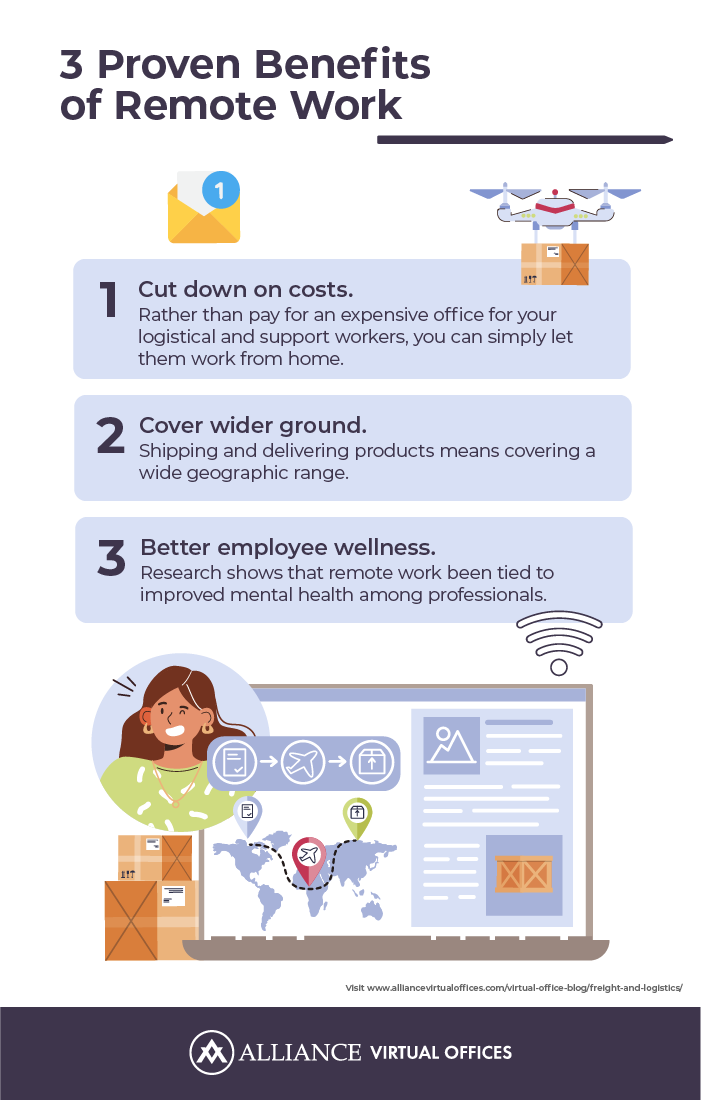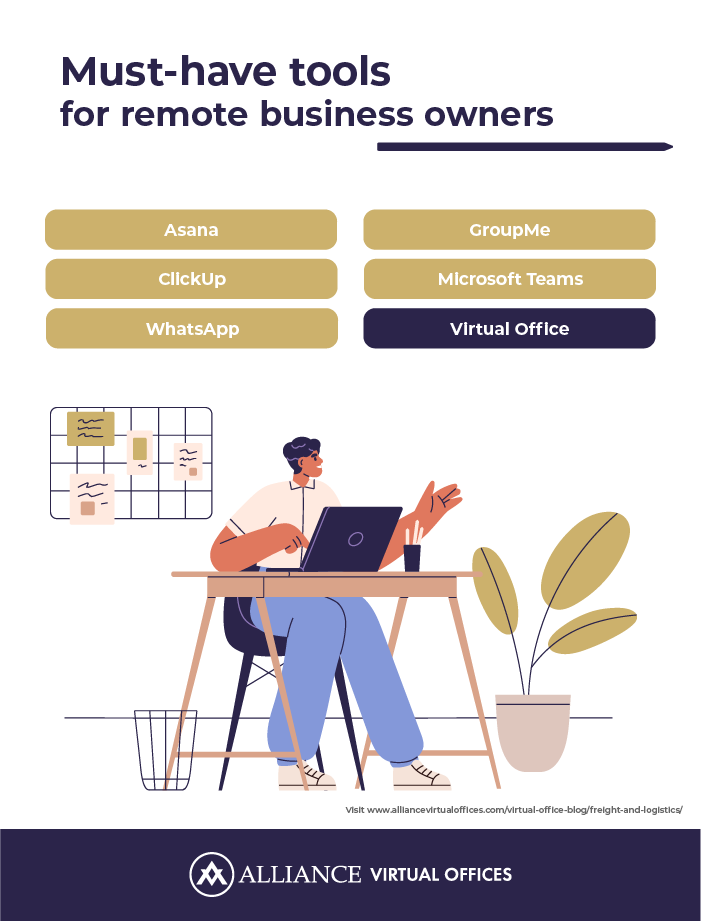- Can your business benefit from remote work?
- The biggest challenges you face running a freight and logistics business
- The best tools for remote operations
Q: Can freight and logistics businesses benefit from remote work?
A: Yes, freight and logistics businesses can benefit tremendously from switching to more remote operations. That said, there are a number of unique hurdles facing freight businesses when switching to remote work. This article explores how you can make the switch successfully.
If you’re looking for a way to make your freight and logistics business run smoother and more effectively, remote work is the answer.
Remote work has quickly become standard across almost every industry. The safety it provided during the pandemic proved essential.
According to Pew Research Center, that trend is set to continue. Experts anticipate remote work will continue to gain prominence across all sectors.
The freight and logistics industry is no exception. In fact, the nature of freight operations makes it particularly well-suited to remote work.
But that doesn’t mean switching to remote work is simple. There are a number of important considerations you need to make if you want to get the most out of your virtual operations.
Here’s what you need to know to make the switch and bring your freight and logistics business into the future.
- Can remote work benefit your business?
- The biggest challenges facing freight and logistics businesses
- Why remote work often fails in this industry
- The best tools for remote freight and logistics operations
The Challenges of Running Freight and Logistics Businesses
There two primary issues plaguing freight and logistics companies.
Communication Issues
The first is communication breakdown.
With truckers and other freight staff constantly on the move, it can be difficult to keep your team coordinated. There are so many moving pieces all trying to connect back to a single headquarters.
This issue only worsens as you grow. The more you expand your freight and logistics business, the more area you cover.
According to CNBC, the demand placed on supply chains is skyrocketing post-pandemic, meaning now is a primetime to grow. However, that also opens the door for communication chaos.
Connecting With Scattered Markets
There is a wide range of markets involved in freight and logistics, meaning there can be a lot of variation in target demographics.
Niching is a vital part of successful marketing. Appealing to a specific audience helps you stand out against the competition.
But for businesses in freight, you may need to find a niche in across different markets to make the most of your marketing.
This can be tricky when working from a single headquarters, as you only have first-hand insights into a single geographic location.
Freight and logistics consulting can help you understand other markets, but it also means hiring outside consultants, cutting into your bottom line.
Remote work can go a long way towards solving both of these issues. Unfortunately, it isn’t always incorporated properly.
Can Freight and Logistics Businesses Benefit from Remote Work?
As with any major change, many freight business owners are skeptical about incorporating remote work into their operations.
Why go to all the trouble to make the switch if your current operations are already working?
Just because something is working doesn’t mean there isn’t room for improvement though, and bringing in more remote work can seriously help your business.
Here are just a few of the perks that come with remote work models:
- Cut down on costs: Rather than pay for an expensive office for your logistical and support workers, you can simply let them work from home. This helps you keep your overhead low, letting your invest more into your business and help it grow.
- Cover wider ground: Shipping and delivering products means covering a wide geographic range. By allowing your administrative and support staff to spread out, you make it easier to address problems across the map. Having “more eyes on the ground” means gaining a better understanding of each location and improves your company’s response times.
- Better employee wellness: Research shows that remote work been tied to improved mental health among professionals. When workers are happy, businesses flourish.
Why Remote Work Often Fails in Logistics
When supply chain business owners try to bring in remote workers, they often do so without proper planning.
They simply add a few employees to their business and let them work at home, without setting up an infrastructure that supports their work.
The employees end up confused and out of the loop. They don’t have enough contact with the rest of the business to efficiently report and communicate.
This results in confusion and delays. What should be making your business run smoother ends up slowing everything down, costing you precious time and energy to try to straighten things out.
When this happens, most business owners punt on the idea of remote work altogether. They switch back to using a centralized, in-person team.
But the problem is not with remote work itself – it’s an issue with the strategies used to implement it.
How to Effectively Incorporate Remote Work
A better way to incorporate remote work into your freight and logistics strategy is to significantly decentralize your operations.
Rather than view your remote workers in various areas as add-ons to your main headquarters, view your business as a net. Each point should be strongly supported and connected.
According to Forbes, making this switch is likely one of the most essential things a freight business can do moving into the future.
To do it properly means setting up a workflow that is standardized across the board and well-suited for remote operations.
The Best Tools for Remote Freight and Logistics Operations
Thanks to the widespread acceptance of remote work, there are numerous tools ready to help you organize your remote workers.
Among the most important are workflow organization platforms.
Apps like Asana and ClickUp help you keep your workflow organized and communication streamlined without having to have in-person meetings.
These apps also let you monitor progress across all departments, making it easy to adjust as you go.
Bringing in these types of apps keeps you from having scattered operations in different areas, making sure each point in your net is strongly connected.
It also makes it easy for people to collaborate over the internet. Your accountant in Dallas can easily work on the same project as your marketing specialist in Seattle.
Speaking of collaboration, you’ll also want to bring in a platform designated for communication.
Messenger apps like WhatsApp, GroupMe, or Microsoft Teams make it easy to form group chats and keep your workers connected, regardless of geography.
Many people underestimate the importance of incorporating a messaging platform, but they can go a long way toward reducing confusion and frustration for everyone.
Finally, bringing in a virtual office can be a powerful tool for you as a business owner.
A virtual office is the perfect way to decentralize your business while simultaneously reducing your operating costs.
Virtual offices provide you with an address you can use to register your business, without having to pay expensive rent for an office space you don’t need.
Additionally, your virtual office gives you the freedom to travel wherever, allowing you to visit the many points in your net on a consistent basis.
These consistent check-ins give you first-hand insight into your business’ operations across all regions, while also helping you connect with your remote workers.
In turn, this keeps your workers engaged and makes it easier to communicate any big changes.
Adding these tools to your business will build the infrastructure you need to usher in remote working capabilities and grow your freight and logistics business in the future.
Conclusion
Remote work is here to stay. The convenience and efficiency it brings to nearly every industry makes it a permanent fixture in the future of work.
Further Reading
- LLC for the Digital Entrepreneur: What You Need to Know When Traveling
- The Industry Leader Trap: Should You Ignore the Major Players?
- The Surprising Impact of Housing Prices on Small Business Location
Freight and logistics businesses are particularly well-suited for remote work. Remote work lets them spread out and cover more ground directly while also keeping their points of contact connected.
If you’re looking to shift your business to more remote operations, investing in a workflow organization platform, a messaging platform, and a virtual office will help you make the transition easy and effective.









